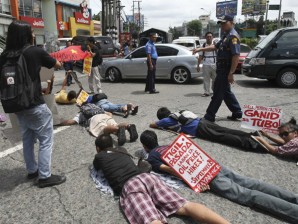2 lawmakers want planking banned
At least two lawmakers on Tuesday moved to ban the use of planking as a form of street protest because of the danger to the students adopting this “playing dead” game popular in the West.
Quezon City Representative Winston Castelo filed a proposed “Anti-Planking Act of 2011,” in which he expressed concern that planking could be used as “a template” for subsequent street rallies or protest actions initiated by students.
“Life and limb are pretty much at risk here where unbelieving bus drivers or law enforcement authorities might just ram through these warm and living bodies rolled out on highways,” he said.
In a new form of protest, members of the militant League of Filipino Students (LFS) on Monday proceeded to lie face down on the pavement on the corner of España and M. de la Fuente streets in support of the nationwide transport strike against fuel price increases, snarling traffic, before they were dispersed by policemen.
They were adopting a youth fad popular in the West which entails lying face down in an unusual or incongruous location, hands to the sides and the body rigid as a wooden plank. Having a photograph of the participants taken and posted on the Internet is an integral part of planking, or the lying-down game.
Article continues after this advertisementParty-list member Rodel Batocabe (Ako Bicol) said planking in major thoroughfares was already illegal under the Public Assembly Act of 1985, or Batas Pambansa Blg. 880, which governs the procedural requirements in the exercise of the right to peaceably assemble.
Article continues after this advertisementManila Police District (MPD) director Chief Superintendent Roberto Rongavilla said planking was a “dangerous” activity for youth activists.
“A driver might be watching for the traffic light and fail to notice them lying on the pavement,” he said.
But LFS national chair Terry Ridon defended planking as covered by the constitutionally guaranteed freedom of expression. With a report from Jeannette Andrade
